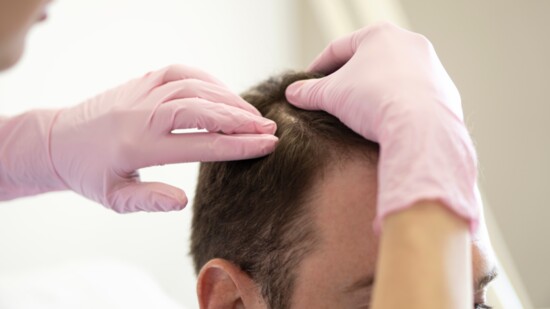Hair loss is a concern for both men and women. While genetics remain a significant factor, lifestyle and societal shifts have also contributed to the increasing prevalence of hair loss. In plastic surgery, addressing hair restoration has become a critical component of wellness and self-confidence. Innovative treatments like Alma TED and SmartGraft are leading the way, offering hope to those experiencing thinning hair or baldness.
Dr. Steven Bailey of Woodstock Plastic Surgery is a trusted local specialist who provides cutting-edge solutions for hair loss, helping patients regain their confidence and achieve lasting results.
The Surge in Hair Loss Trends
The rise in hair loss has been attributed to several factors:
1. Pandemic-Related Stress
The COVID-19 pandemic brought a wave of emotional and physical stress, leading to a condition called telogen effluvium, where hair prematurely enters a resting phase and falls out.
2. Postpartum Hair Loss
As more women openly share their postpartum journeys on social media, awareness of post-pregnancy hair loss has grown. Hormonal changes after childbirth often lead to temporary but distressing hair thinning.
3. GLP-1 Medications
GLP-1 medications, often used for weight loss, can contribute to hair loss due to the rapid weight reduction they cause, which may stress the body and disrupt the hair growth cycle (telogen effluvium). Dietary changes associated with these treatments can lead to nutrient deficiencies, further affecting hair health.
4. Hormonal Changes in Men and Women
Androgenic alopecia, or pattern hair loss, is a leading cause, but hormonal imbalances due to conditions like PCOS and sensitivity to DHT (dihydrotestosterone) are also contributors.
Advanced Hair Restoration Options
For individuals experiencing hair loss, the impact goes beyond physical appearance. Hair is linked to identity, youth, and vitality. Hair restoration treatments do more than restore hair—they restore confidence. Individuals who address their hair concerns report feeling rejuvenated, attractive, and ready to face challenges with renewed vigor.
In the world of plastic surgery, cutting-edge technology has revolutionized hair restoration:
Alma TED (TransEpidermal Delivery)
-
How It Works: This non-invasive ultrasound-based treatment delivers active growth factors and nutrients directly to the scalp.
-
Benefits: Painless, quick, and effective for early-stage hair loss. No downtime is required, making it ideal for busy individuals.
SmartGraft Hair Transplant
-
How It Works: A minimally invasive Follicular Unit Extraction (FUE) procedure that harvests healthy hair follicles and implants them in thinning or balding areas.
-
Benefits: Natural results with minimal scarring, faster recovery, and customizable to each patient’s needs.
Debunking Myths About Hair Loss
With information circulating about hair loss, it’s easy to fall prey to misconceptions.
Myth #1: Hair loss is only hereditary.
Reality: While genetics play a role, factors like stress, diet, and medical conditions also contribute.
Myth #2: Only older individuals experience hair loss.
Reality: Hair loss can begin as early as the teenage years, often due to genetics, stress, or lifestyle.
Myth #3: Hair transplants look unnatural
Reality: Advanced techniques like SmartGraft ensure natural-looking results, with careful attention to hairline design and follicle placement.
Myth #4: Only men experience hair loss.
Reality: Women make up nearly 40% of those affected by hair loss, highlighting the need for awareness and targeted treatments.
Myth #5: Over-the-counter products are enough.
Reality: While some products may help, professional treatments like PRP, Alma TED and SmartGraft offer targeted solutions with proven results.
Impact of Celebrity Trends
Celebrities have played a major role in normalizing hair restoration treatments. Public figures like Elon Musk, John Travolta, and even influencers on TikTok openly discuss their hair restoration journeys. These high-profile endorsements have reduced stigma, encouraging individuals to seek professional help.
Social media has fostered a heightened awareness of appearance, pushing both men and women to address thinning hair proactively. Treatments like Alma TED appeal to those looking for subtle, non-invasive solutions, while SmartGraft attracts those seeking dramatic, lasting changes.
Who is the Best Candidate for Hair Loss Treatment?
The ideal candidate for hair loss treatment varies based on the cause and extent of the problem.
-
Individuals with Early-Stage Hair Loss: Alma TED is perfect for those noticing thinning or mild shedding.
-
Patients with Androgenic Alopecia: Aside from medications, SmartGraft works well for pattern baldness in men and women.
-
Individuals Seeking Wellness Transformation: Hair restoration often complements other lifestyle improvements.
-
Those Experiencing Stress-Related Hair Loss: Early intervention can prevent further damage.
-
Patients Looking for Confidence Boosts: Anyone feeling self-conscious about their hair loss can benefit from treatment.
Q&A with Steven Bailey, MD on Hair Loss Treatments
Q: Are there trends that have increased hair loss?
A: Absolutely. Stress from the pandemic, over-styling with heat tools, and poor nutrition are major contributors. Hormonal imbalances from lifestyle changes and medical conditions also play a role.
Q: What are the most effective treatments for hair loss?
A: It depends on the cause. For androgenic alopecia, medications/supplements and hair transplants are incredibly effective. Alma TED works well for thinning hair when used in conjunction with medications that can slow progression.
Q: What are the risks of delaying treatment?
A: The longer hair loss is ignored, the harder it is to restore. Once follicles are inactive, surgical intervention may be the only option. Early action preserves existing hair and improves outcomes.
Q: How do patients respond to hair restoration treatments?
A: The psychological impact is profound. Restoring hair restores confidence. Patients frequently express feeling younger, more vibrant, and ready to engage in life more fully.
Hair loss is no longer a silent struggle. Thanks to advancements in treatments, addressing hair loss is more accessible than ever. As conversations around this issue grow, fueled by celebrity influence and societal shifts, more individuals are taking control of their wellness journeys.
Connect with Dr. Bailey and Woodstock Plastic Surgery at woodstockplasticsurgery.com and on Instagram @woodstockplasticsurgery.
"Thanks to advancements in plastic surgery and non-surgical treatments, addressing hair loss is more accessible than ever."
